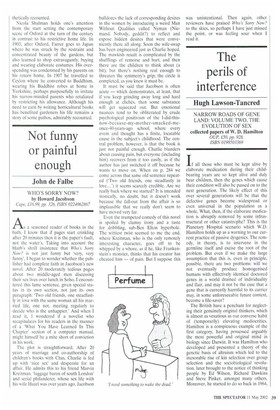Not funny or painful enough
John de Falbe
WHO'S SORRY NOW? by Howard Jacobson
Cape, £16.99, pp. 326, ISBN 0224062867
Aa seasoned reader of books in the bath. I know that if pages start crinkling after 20 minutes then it is the paper's fault, not the water's. Taking into account the blurb's shrill insistence that Who's Sony Now? is not just funny but 'very, very funny', I began to wonder whether the publisher had complete faith in Jacobson's new novel. After 20 moderately tedious pages about two middle-aged men discussing their sex lives over lunch in Soho, I encountered this lame sentence, given special status in its own section, not just its own paragraph: Two old friends, one steadfastly in love with the same woman all his married life, one not, meeting regularly to decide who is the unhappier.' And when I read it, I wondered if a novelist who recapitulates for his readers in the manner of a 'What You Have Learned In This Chapter' section of a computer manual, might himself be a mite short of conviction in his work.
The plot is straightforward. After 20 years of marriage and co-authorship of children's books with Chas, Charlie is fed up with 'nice sex' and desperate for an affair, He admits this to his friend Marvin Kreitman, 'luggage baron of south London' and serial philanderer, whose sex life with his wife Hazel was over years ago. Jacobson bulldozes the lack of corresponding desires in the women by introducing a weird Man Without Qualities called Nyman (Niemand, Nobody, geddit?) to reflect and expose hidden desires that were conveniently there all along. Soon the wife-swap has been engineered just as Charlie hoped. The mawkish result is complicated by the shufflings of remorse and hurt, and then there are the children to think about (a bit), but there's nothing real enough to threaten the symmetry's grip; the circle is completed, as you knew it must be.
It must be said that Jacobson is often acute — which demonstrates, at least, that if you keep grinding away long and hard enough at clichés, then some substance will get squeezed out. But emotional nuances tend to be obliterated by crude psychological positivism of the I-did-thisnow-because-my-mother-sm acked-meonce-40-years-ago school, where every event and thought has a finite, locatable cause in the subject's childhood. The central problem, however, is that the book is just not painful enough. Charlie blunders about causing pain, but everyone (including him) recovers from it too easily, as if the author has just switched it off because he wants to move on. When on p. 284 we come across that same old sentence repeated (`Two old friends, one steadfastly in love...) it seems scarcely credible. Are we really back where we started? It is intended ironically, no doubt, but it doesn't work because the fall-out from the affair is so implausible that we really don't seem to have moved very far.
Even the trumpeted comedy of this novel is spoiled by clumsy irony and a taste for dribbling, sub-Ben Elton hyperbole. The wittiest twist seemed to me the end, where Kreitman, who is the only remotely interesting character, goes off to be whipped by a whore, as if he, like Frankenstein's monster, thinks that his creator has cheated him — of pain. But I suppose this was unintentional. Then again, other reviewers have praised Who's Sony Now? to the skies, so perhaps I have just missed the point, or was feeling sour when I read it.






































































 Previous page
Previous page